Come on, are carbs sugar? Does that mean all carbohydrates are sugar?
Let’s have some fun and answer those questions with a question…
What is sugar, Alex?”
If you ever find yourself on the TV game show, Jeopardy, and the category is CARBOHYDRATES, your response will always be, “Alex, What is sugar?”
The audience will ‘ooh’ and ‘ahhh’.
They may be a bit dumbfounded, but impressed by your calm, unwavering confidence as you cooly speak the same answer for every question and keep racking up your money points.
When you think about it, it would be a bit embarrassing to give the same answer over and over. In fact some of the audience may even cringe a bit as they think to themselves, “Surely it can’t be the same answer for all of these category questions”.
But it is.
The Jeopardy Category is CARBOHYDRATES…
ANSWER: (read in Alex Tribecks’ signature upbeat, authoritative and articulate tone), ”The individual molecules that make up a cream puff, a candy bar, and soda pop.”
“What is sugar, Alex?”
“The individual molecules that make up spinach, an apple, and a rhutabaga?”
“What is sugar, Alex?”
“The individual molecules that make up a Philadelphia soft pretzel, a New York bagel, and a Prince Edward Island potato?”
“What is sugar Alex?”
“The individual molecules that make up farm fresh vegetable juice and food industry bottled fruit juice?”
“What is sugar, Alex?”
“The individual molecules that make up locally grown raw vegetables, organic fruits, and ancient whole grains?”
“What is sugar, Alex?”

Are Carbs SUGAR?
The answer is…. YES.
Less than ideal. Am I right?
At the very least, an inconvenient truth.
It was a truth I fought against. But a truth I now embrace.
Life will do that to us. Hand us an inconvenient truth. There will be great pain and reckoning until we accept it.
But What About a Plant-Based Diet?
Regardless of purity, wholeness, nobleness, realness, organic-ness or righteousness, the plant-based diet is a glucose-based diet.
In a court of law or money prize game show, the plant-based diet is a “What is glucose-based diet, Alex?”
Plants are primarily carbohydrate food. All carbohydrate are glucose. All glucose is sugar. All carbohydrate are sugar. Plant = Carbohydrate = Glucose = Sugar
“I don’t eat ANY sugar”, declared the vegan yogi at the Namaste juice bar.
Vegetarians, vegans, and plant-based proclaimers eat sugar.
Surely not the offensive white granule stuff which carries the reputation of being nutritionally inferior, poisonous and deadly. Not THAT sugar. (Cue sounds of horror and revulsion.)
No. Not that sugar.
But the precious and highly regarded, plant-based diet is indeed a sugar-based diet. It is a glucose-based diet. It is a carbohydrate-based diet.
How Can a Plant-Based Diet Be a Sugar-Based Diet?
Every plant is sugar.
Every plant food is made of starches and sugars which all digest to glucose. Sugar.
Glucose is one fuel source our body utilizes.
1.) Glucose is quick energy.
2.) Glucose is also converted and stored as the body’s other fuel source, fat.
3.) And finally, a little known fact – glucose is produced by our body.
Screeeeech.
Now, wait a minute.
Your. Body. Makes. Sugar.
Did I read that right? Glucose is made by our body?
Our body MAKES glucose? My body makes sugar?
Yes. Your body makes sugar. It makes glucose.
This is why carbohydrate, as a food category, is non-essential.
Carbs Are Not Essential
The plant-based diet push has us consuming more and more glucose that our body makes itself.
Is it any wonder we are plagued by glucose-related illnesses? We are over-loading and over-burdening our body with a fuel we can create internally.
Now, let’s be responsible here.
This article is not anti-plants, nor is the author (me) anti-plants. Not in the least!
This author is grateful for plants (and trees!), enjoys plants and is pro-plants…..to a point.
It’s the misleading, security seduction that I find disconcerting and downright deceitful.
It’s irresponsible. Especially if the message is directed to the vulnerable and at-risk for whom glucose could be the difference between living and dying.
Surely the woman battling breast cancer BELIEVES that her switch to organic juices along with a daily uptick in fruits, vegetables and whole grain consumption is the best thing she can do for her health and survival.
Certainly, eliminating processed foods translates into eating less carbohydrates and therefore less glucose/sugar, but it’s not “all she can do”. Good Grief, no.
Breast Cancer Loves Glucose
Breast cancer, a glucose-sensitive cancer, is all about glucose. Glucose, and the growth hormone, insulin that glucose calls into action, are cancer’s life fuel, proliferation power, and most crucial support team.
Glucose is cancer cell fuel.
Why the hell would we encourage a glucose-based diet to a woman fighting a glucose-backed cancer?
Why?
Why do we allow the charade to continue? Are we really that easily influenced by colorful posters, gallery-worthy food art, and propaganda-like words such as pure, noble, righteous, and moral???
Why don’t we all pause, take a close look, and SEE it?
Perhaps it’s the ‘pausing’ that is the challenge. We are a busy, over-stimulated, self-driven, scheduled people. Life offers no pause button.
We lack the luxury of time to study, ponder, and learn.
Or maybe it’s the ‘seeing’ that is the hard thing. Seeing requires releasing bias, belief, and opinion. You know, ‘a mind must be emptied before it can be re-filled’ way of thinking. It must be open.
And there is also the conscious or sub-conscious push-back that erupts from the fact that we might not like what we see.
What we see might indeed prompt uncomfortable change.
- Change in alliances.
- Change in identity.
- Change in self-rightness.
- Change in slogans, mantras, and money flow.
- Change in what’s on the table at the gala buffet.
- Change is hard.
But it’s doing the hard thing that saves lives.
Doing the unpopular thing.
Doing the thing that goes against “our thing”.
Right about here, the “but, it’s good carbs,” argument commences. Rationalization and justification activated. The good v bad, the organic v not organic, the moral v immoral, the seasonal/local v big industry. The carb wars.
Carbohydrate War
While the food fighters debate the merits of their mantras, the practical approach is to apply first principle. Boil the thing down to its most basic components then reason up from there.
Start from the very bottom.
What is a Carb?
It is abbreviation for Carbohydrate.
a.) Carbohydrate is sugars and starches.
b.) Carbohydrate is a non-essential macronutrient.
c.) Carbohydrate is fuel.
Every carbohydrate is either a sugar or a starch. A sugar means it’s a simple carbohydrate made up of individual molecules of glucose. Simple. A starch is a complex carbohydrate that’s made up of chains of glucose molecules.Complex.
Carbohydrates Are Sugar
“Whether you are taking in simple or complex carbohydrates, your body doesn’t discriminate when it breaks them down into simple glucose in your digestive tract where it’s absorbed into your bloodstream.”
Vegan Betrayal – Mara J. Kahn p.107
As we already mentioned, carbohydrate are non-essential because the body can generate glucose from protein. Carbohydrate has just one role in our body, fuel.
Carbohydrate is one of the three macronutrients that all foods are comprised of. The other two are protein and fat. To understand carbohydrate it’s important to understand the other macronutrient players.
Animal Protein vs Plant Protein
Protein is amnio acids.
When our body digests protein, the final products are amino acids. Amino acids are building blocks for our body parts. Amino acids basically build and repair all kinds of body tissue.
Because our body cannot make amino acids we must get them from our food.
Protein, therefore, holds the distinction of being an essential macronutrient. Some foods contain lots of readily usable protein.
Animal foods, because they are animals like we are animals, deliver the ideal kinds of protein in the ideal amounts for our body. Eggs and meat are examples. Eggs and meat give us protein, no carbohydrate, and some beneficial fat.
Read – “Is Red Meat Healthy?”
Some plant foods contain plant protein. Plant protein can be useful. However, to glean a mere 8 grams of plant protein we’d also glean 5 times the amount of glucose. This is the plant protein challenge. The measly bit of protein (8g) comes with a high glucose price tag (40+g).
Protein Can Replace Carbohydrate Fuel
Protein is powerful. And it’s adaptable. So adaptable in fact that it can replace carbohydrate’s function.
Carbohydrate’s single function is fuel. When necessary, protein can take carbohydrate’s place.
Your magnificent body converts protein, as needed, into glucose.
It’s called, Gluconeogenesis.
‘Gluco’ – glucose. ‘Neo’ – new. ‘Genesis’ – creation.
Creation of new glucose.
Our body is like a great magician. Transforming things. Pulling surprises out of thin air. Creating something from seemingly nothing.
That protein can be converted and used as glucose puts carbohydrate way down on the value ladder. Why hire carbohydrate when protein can do not only its job of building and repair but also carbohydrate’s job of fueling?
And right here. Right at this boiled down science truth, any one in any form of cancer circumstance should be paying attention…
Glucose feeds cancer. Therefore carbohydrate, which is non-essential and breaks down into glucose, feeds cancer. Furthermore, protein can fill carbohydrate’s role. It’s time to reconsider plant-based thinking. Kick it around. Examine it more closely. Challenge popular opinion.
Carbohydrate Fuels Cancer
Protein can fuel cancer, some.
This is what makes beating cancer so hard. Just about everything we’re eating is, to varying degrees, supporting cancer.
But here’s what makes beating cancer easier. Cancer cells need about 30 times more glucose than healthy cells. That’s a boatload more. So even reducing glucose intake a bit could prove to be the blow to cancer cells’ ability to grow.
Okay, let’s review:
1.) Carbohydrate, which is non-essential, breaks down to glucose upon digestion.
2.) Glucose moves into the blood stream. This is what we call blood sugar. Carbohydrate becomes our blood sugar.
3.) Insulin, the fat storage and growth hormone is released from the pancreas in response to the influx of glucose into your blood.
4.) Glucose’s singular function is fuel. If the body’s cells are in need of fuel at the time of eating, some glucose is put to use. The rest is shuttled into storage in fat cells.
5.) And some of that excess glucose is further processed into micro-particles of sugar that are dispersed throughout the entire body. These sugars adhere to the delicate tissue of brain cells, nerves, blood vessels, etc driving degenerative and debilitating conditions like Alzheimer’s, neuropathy, and heart disease. Accumulated sugar- damaged proteins are called AGEs. Advanced Glycated Endproducts.
The Carbohydrate Conundrum
Of the three macronutrients, carbohydrate is the culprit behind obesity, aging, and cancer. But it’s the one that is revered, celebrated and paraded around on posters and food right-ness literature.
And of the three macronutrients, the one that’s been feared, vilified, and held in great contempt, is the one that actually slows aging, assists with weight loss, and does not feed cancer…
Fat
Uninvited to the party, dismissed from family gatherings, and regarded with great suspicion, trepidation, and even disgust, fat, like protein, is essential.
Our body cannot produce the necessary fatty acids critical to sustaining life. We must consume it.
Fat comes in many varieties. As a food category it can be quite confusing. The simplest approach is to remove any human involvement. Meaning, choose fat that comes directly and unaltered from nature.
Some excellent fat source options are eggs, salmon, and real butter. There are many, many more.
Fat, unlike protein and carbohydrate, cannot fuel cancer.
Repeat: Cancer cells cannot utilize fat as a fuel source.
There it is. The boiled down principle any of us can wield in our cancer-defeating quest.
1.) Fat contributes zero glucose to our blood sugar.
2.) Fat contributes fatty acids, the foundational raw material for cell membranes, hormones, and nerve structure.
3.) Fat contributes to supple blood vessels, resilient brain cells, and insulated nerve-firing activity.
4.) Fat does so many good things for our body and at the same time doesn’t support cancer cell establishment nor growth.
And in keeping with the theme of this article, fat is not in any way, or in any form, or in any amount, sugar.
Are Carbs Sugar? ALL Of Them??
Yes. All carbohydrate is sugar.
But more clarity is called for.
This is where the pack separates.
Some are ready for the classroom. Open to doing the hard thing. Rolling up the sleeves.
Others prefer to continue the denial dancing.
After all, there are pills and potions and powders and products and promises that can pacify your problem.
Why put out effort to understand it? That sounds like a lot of work and overwhelm. And besides, the ‘eat pretty, eat pure’ hoopla generated by nutrition-based wellness platforms are certainly appealing. They play into our human desire to be admired, to be appreciated, to be blameless, to belong.
There is the seductive tease of easy. Let us handle this for you.
Denial is easier in a group. Collective thinking overrides individual thinking. Humans are wired to feel safer in community than going it alone.
And we are safer in community. Unless that community is so distracted by the singing and dancing that they can’t see the fall up ahead.
Beware… Be Aware… Be Glucose-Aware
Becoming glucose-aware is easier than you might think.
The power lies in your decision to see it. Every good fable includes the life lesson, “Do not be deceived by appearances.”
Marketing and mind-trickery abound. We needn’t look far to find what appears to be the oh-so-‘good’ food directives including…
- Eat pretty.
- Eat the rainbow.
- Eat real.
- Eat clean.
- Eat plant-based.
- Eat organic.
- Eat seasonally, locally, and morally.
- Eat with a fork instead of a knife.
Despite outward appearances, none of these gets a person out of cancer, or diabetes, or heart disease or Alzheimer’s. None of these makes MS or Parkinson’s or Type 1 easier.
If anything, these directives add to the overwhelm and confusion because none of them actually explains anything worth while. Sadly, people put out effort, and time, and money, and engage in hope only to find themselves defeated and in despair.
- Decision fatigue.
- Hope fatigue.
- Defeat fatigue.
While most eating directives are grounded on abstract qualities like feeling right, love, morality and beauty, eating boils down to one purpose: fueling. That’s it.
However, in today’s world eating has evolved from fueling to full-blown worship; entertainment, art, tribe alliances, self-expression, big business, personal identity, and lots of emotion.
We can understand human’s love-based conceptions of food. The brain is wired to desire glucose-based food. Hormones and neurotransmitters are triggered upon eating glucose-based food.
Community and comfort and carbohydrate consumption all fire the same nuero-transmitter messages in the brain. Talk about an emotional rise! And what fires together, wires together. And we, if uninformed, are helpless against it.
Learn why we are wired to desire certain foods and its connection to Hormonal Weight Loss.
Why We Are Hungry All The Time!
One of the more recent food-health platforms involves our ‘not eating too much.’
The directive goes something like this. Eat real food. Mostly plants. Not too much.
Is there anything more humiliating and shameful than not being able to ‘not eat too much”? To adopt a plant-based diet only to find you’re more hungry than ever?
To eat more real, organic foods only to discover that you’re grazing all day?
To strictly adhere to the ‘eat more fruit, vegetables and whole grains’ only to watch your cancer grow, your blood sugar rise, and your brain function deteriorate?
And the insult to injury?
You can’t stop eating. You develop incessant cravings and intrusive thoughts about food.
- You desire food.
- You want food.
- You love food.
Eating becomes both pleasure and pain. And you’re so over it. But you can’t get over it.
Oh…. To just not want to eat. THAT would be freedom!
Read about how to Forget To Eat.
Food Science & Glucose Facts
I have great news for you. Being glucose-aware frees you from desire’s snare. Glucose is the underlying cause for every food-related struggle. From cravings to cancer. And every degree of lousy in-between.
Let’s look at some glucose facts and figures. The fastest way to wrangle “food love” is to put some facts and figures behind it. Numbers don’t lie.
Food Math / Science Lab
You now know that all carbohydrate – the good, the bad, the pretty, the ugly – are all sugar.
Sugar is fuel.
There’s no character association or labeling required.
So, how much sugar fuel does our body need? How much sugar fuel does our body tolerate? How much sugar fuel should we choose to consume?
“There’s sugar in my blood!”
How Much Sugar Does My Body Need?
Everyone remain calm. There’s sugar in everyone’s blood. Every one of us.
All humans’ blood sugar threshold is somewhere between 3 grams and 5 grams depending on body size.
- NFL Linebacker? 5 grams.
- High School Cheerleader? 3 grams.
The rough estimate for all humans averages at about 4 grams. Powerful science fact. The ideal, healthy, normal quantity of sugar in our blood is 4 grams.
Here’s The Science Behind Blood Sugar…
An average-sized human has about 4 liters of blood circulating throughout their body. The ideal sugar portion of the blood’s composition is 1 gram per liter. One gram of glucose-sugar in every 4 liters = 4 grams total throughout the blood.
Let’s take that 4 grams amount and create a more concrete visual.
Using a kitchen measuring spoon, 4 grams is roughly 1 teaspoon.
One teaspoon.
Now, taking into account what we’ve learned, we can apply what we know to the food actions we’ve been directed to take.
Those of you who are already glucose-aware may have quickly done some math. Yes?
Perhaps your nutritionist or dietician has you consuming about 50 cbs per meal. With 15 cbs between meals for snacking. “You know. To keep your metabolism up.” Eye roll. Crikes.
Anyway, that could total about 180 grams of cbs, which is sugar, daily.
But our body will have to process all that sugar to bring the total sugar in our blood back down to 4 grams. That’s a lot of sugar (176 grams or 44 teaspoons!) to process.
The Insulin / Weight Gain / Body Fat Accumulation Connection
And all that blood sugar will be triggering lots of fat-storage-promoting insulin. Whenever insulin is up body fat stores are closed. No one burns body fat when insulin is unchecked. Belly fat, anyone?
Knowing that carbohydrate is glucose and glucose (blood sugar) feeds cancer cells, and glucose (blood sugar) triggers our fat storage – fat lockdown hormone, insulin, and glucose ends up being carried as belly fat and corroding tissues, vessels and nerves, we find ourselves not in a place of defeat but in a position of power.
And the POWER is… we can choose how much glucose we want to deal with.
Eating… How To Reduce Blood Sugar Levels
A bit more clarification here.
1.) Eating always translates into blood sugar/glucose.
2.) Your blood stream will have more than the ideal 4 grams of blood sugar, at times.
3.) Insulin will respond activating the various pathways to shuttle that glucose out of the blood, distributing it throughout the body.
4.) Blood sugar value fluctuates all day, every day… for every human.
5.) Insulin responds tirelessly to get that sugar out of your blood, returning your blood sugar to the ideal 4 grams amount.
To better understand inulin’s monumental role, recall a time when you were shoveling while it was still snowing. Or digging a hole while others kicked more dirt in. You keep removing the stuff while more stuff keeps piling in.
Going a bit further, insulin is also directing where the ‘snow’ pile goes and how to best distribute all that ‘snow or dirt’. Your body doesn’t have the luxury of just making a pile. Every bit of blood sugar must go somewhere.
And here are the blood sugar distribution options…
- Around your waist – Waist weight is carbohydrate.
- Attached to your nerve cells – Neuropathy, Parkinson’s, MS.
- Clinging to your joint tissue – Chronic pain, Arthritis.
- Corroding your blood vessels – Atherosclerosis, High Blood Pressure.
- Forming plaque on your teeth and brain cells – Gingivitis, Dementia and Alzheimer’s.
- And being inhaled by greedy, unchecked, deformed cells – Cancer.
Some of us (diabetes folk) know it’s happening. Most of us have no idea.
Let’s offer up a big dose of gratitude to those in the know. Diabetes is the messenger of the 21st century. Are you listening?
Blood Sugar and Insulin
The dynamic duo of growth and of destruction. Yes. We need both to sustain life. But we need far, far, far, far less. In fact, we need hardly any at all.
The Carbohydrate / Glucose / Sugar Connection
It’s time to apply what we’ve learned.
First let’s compare a conventional food to its organic version.
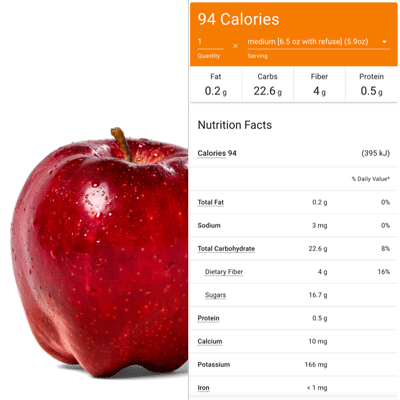
A Simple Example is Fruit
Organic fruit will, we believe, be without any pesticide residue or other negative consequence. Ethical, earth conscious, and responsible farming practices are upheld. (Although any farmer knows there’s always a victim. Death sustains life. Micro-organism death, insect death, field creatures death, mice, frogs, snakes, moles, slugs…you get the picture.)
An organic apple may carry less pesticide residue, but it carries exactly the same amount of sugar. Organic does not cancel out carbohydrate content.
And yes, you do subtract out the fiber value. Fiber is not glucose. Fiber isn’t even digested. It just passes through.
One medium sized (5.9 oz) Golden Delicious Apple
Total carbohydrate: 22.6 Grams
Subtract the fiber value: 4 Grams
Total Net Carbohydrate = 18.6 Grams
One apple is 18.6 grams of sugar.
Every 4 grams of carbohydrate is equivalent to 1 teaspoon of sugar.
18.6 divided by 4 = 4.65 or about 5 teaspoons of sugar.
Eating an apple a day for health means eating 5 teaspoons of sugar daily. Organic or not organic, everyone gets the same 5 teaspoons of sugar with every apple.
Makes us rethink the “Apple a day keeps the doctor away.” Some replace “away” with, “well paid”!
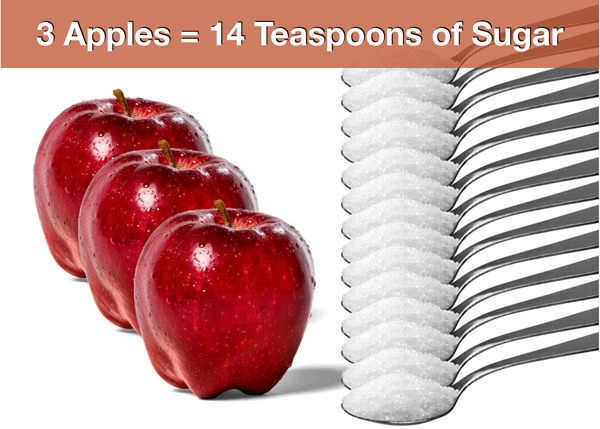
The Compounding Effect of “Good” Carbs
Okay, now look at the apple example based on the “eat healthy” rules of society.
We’ve heard it time and again, from the medical community, nutritionists, and dieticians.
“Make sure you get your (3, 4, 5) servings of fruit a day!”
Let’s average it out to 3 servings of fruit a day. Using the apple as our fruit, 18.6 x 3 = 55.8 or 56 grams of sugar.
That’s 14 teaspoons of sugar!
Yes, it is fruit.
Yes, it is natural.
But yes, it is sugar.
Cancer cells will be grateful for those 14 teaspoons of sugar coming in just from your fruit snacking!
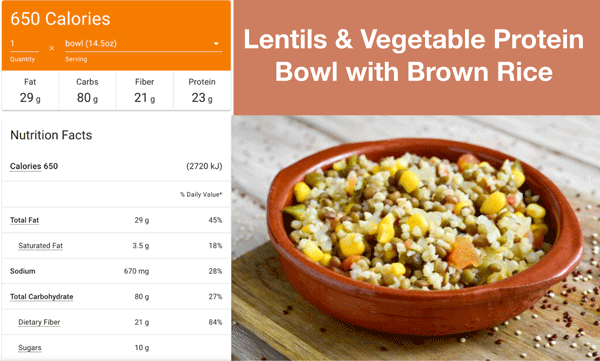
The Typical ‘Healthy’ Plant-Based Lunch
Let’s look at a typical ‘healthy’ lunch directive. Here’s an example of an organic, socially responsible, plant-based meal.
Hearty lentils, rich butternut squash and roasted tomatoes served over brown rice with lemon-tahini dressing, then topped with crunchy sunflower seeds. This flavor-rich bowl packs 23 grams of protein and is certified Vegan. The epitome of blameless, pure, nutritionally sound, plant-based eating.
This used to be my idea of healthy eating. That was before I became glucose-aware.
Total Carbohydrate: 80 Grams
Fiber: 21 Grams
Net Carbohydrate: 59 Grams
This incredibly healthy looking lunch deposits 15 teaspoons of sugar into our blood. 15!
Believe me. I feel ya. I felt so defeated when I first learned this truth.
However, there’s greater pain in not knowing than knowing.
My vegetarian, don’t-hurt-the-planet heart was devastated when I found out that eating a grass-fed beef burger would add zero sugar to my daughter’s bloodstream compared to this vegan meal that added 60 grams of sugar.
Could my plant-based philosophy have contributed more pain to my child’s life. Yea.
And, YES. It certainly did.
The UN-Healthy of Healthy Foods
My daughter is Type 1. Her body produces no insulin. She (more than I) intimately knows carbohydrate/sugar and insulin. It took a major life curve-ball to get my attention.
Make no mistake about it. Carbohydrate is sugar.
Even organic, vegan, raw, oh-so-pretty to the eye carbohydrate is sugar.
It’s an uneasy peace.
I was and still am to a degree, uneasy with what feels like criticism for a movement that’s intention is to help people be healthy and save the planet at the same time. You know, the “be the change’ and support local farmers! Talk about wrenching moral discord.
But then I look at my daughter who beat herself up and the woman with breast cancer who couldn’t lose the estrogen-churning waist weight her doctor told her to lose.
Both of these tender souls were victims of the plant-based, glucose-based insanity. Plants and glucose are not evils. But they do cause a body lots of troubles.
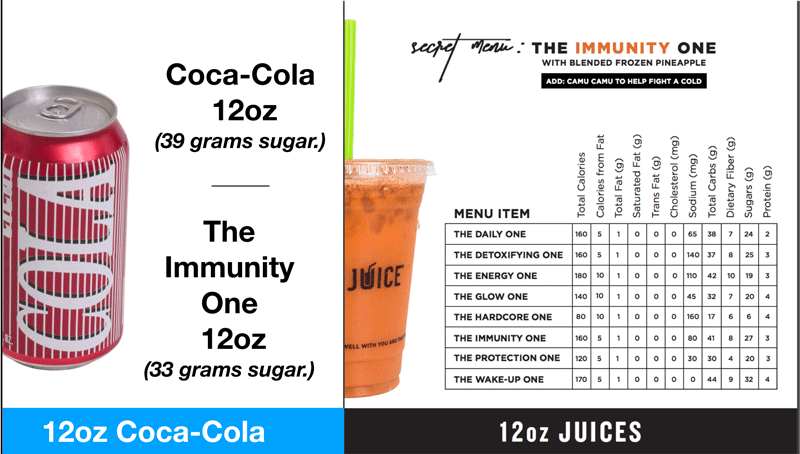
“Namaste Juice Bar” Juice v. Coca-Cola
Namaste Juice Bar is my made-up, hypothetical store name for the organic, eats and drinks businesses. It’s critical we keep in mind that all food and drink places are businesses. Smart businesses watch social trends carefully and generate products that will generate dollars.
Passionate folks are willing to pay.
So let’s compare a few of these pricey, marketed as good-for-your-health beverages to Coca-cola…
- 1 can of Coca-cola contains 39 grams of sugar.
- Clean Juice’s “The Immunity One” contains 33 grams of sugar.
- “The Wake Up One” contains 35 grams of sugar.
Surprisingly, there’s just 4-6 less grams of sugar separating Coke from what’s well regarded as more healthier selections.
This is not to say that we should be drinking more coca-cola. This is to say that reaching for drinks at our local Namaste Juice Bar might not be the health-benefitting action it appears to be.
Sugar is sugar is sugar. The body does not discriminate. Cancer cells are just as happy existing on ‘superior’ organic sugar as any ‘inferior’ processed versions.
We could go on for days.
Comparing whole grain, high priced organic gluten-free waffles to the old standby of Aunt Jemima. Interesting to note, store-bought gluten-free products tend to a have higher carbohydrate count than gluten containing products. What’s a celiac to do?
The ‘Are Carbs Sugar?’ Wrap Up
It’s a lot to take in.
But take in we must.
Knowing carbohydrate’s role in our particular health challenge is critical.
Few communities and health champions spend the time, put forth the effort, roll up their sleeves and do the true task of self-trial and error. Then there’s the work of educating.
There’s lots of placating though, “Just get off processed food and sign-up for the fund-raising event”. And of course there’s also medicating, “Just take your meds and watch what you eat.”
Good F$@#*! Grief.
In Summary: Every Carbohydrate Food is a Plant Food.
- Every carbohydrate is sugar.
- A plant-based diet is a glucose-based diet.
- Glucose is the science word for sugar.
- All carbohydrate is blood sugar.
- Carbohydrate, upon digestion, becomes blood sugar.
- Everyone’s blood sugar amount rises and falls throughout each day and night.
- Insulin is the hormone that moves the sugar out of the blood and distributes it throughout the body.
- When insulin is elevated the body is unable to access body fat for fuel. Insulin supports cancer growth, too.
- Glucose is one of two fuels for cells.
- Glucose is carried around our waist when it’s shuttled into storage and converted to stored fuel, fat.
- Glucose, upon further processing, sticks to all sort of proteins in our body. This marks the aging process.
- Those who eat carbohydrate or glucose-focused age faster than those who eat fat-focused.
- Glucose is also taken up by ravenous cancer cells.
- Less glucose is always best.
- Less carbohydrate is always wise.
- Glucose drives Alzheimer’s.
- Glucose drives cancer.
- Glucose drives diabetes.
- Glucose drives heart disease.
- Glucose drives fibromyalgia.
- Glucose exacerbates every autoimmune condition from MS to Alopecia.
- Glucose teases and torments Parkinson’s, Type 1, and every form of mental illness.
What is a Carbohydrate?
Meatless Mondays are Sugar Mondays
Plant-Based Burgers are Glucose Burgers
Forks Over Knives is Glucose Over Fat and Protein
You see, we’ve had the wool pulled over our eyes.
How could we know that carbohydrate is sugar unless we’d been dealt a lousy-life hand that demanded we SEE it?
My daughter’s Type 1 condition forced me to see it.
Type 1 Diabetes is a dictator. There are non-negotiable unwavering demands. Constant. 24-7 demands that we intimately KNOW… sugar.
And while the rest of the world is in a love affair with their ‘sugar food’, we SEE it for what it truly is.
Do you?
I oftentimes feel like I just might be going crazy. When I see the buffets, banquets, and food beauty. The love poured into the organic harvest celebrations to support the very souls who are glucose-compromised. The woman with breast cancer helping herself to a plate of pretty foods that she’d been led to believe is not only problem-free, but with medicinal super-powers. Everyone else sees nutrient-dense, artistry, clean, real, and whole.
I see glucose. Glucose. And more glucose.
The Sugar-Coating
Fear Not!
Your body CAN handle glucose.
Just not in the quantity and consistency you’ve been throwing at it.
I hope this article has you ‘seeing’ that the emperor is not wearing any clothes!
When the doc or the dietitian or the disease demonstrator offers you their good carbs, good grief! You can shrug it off and say, “Sounds like a lot of glucose.”
POST SCRIPT: A Chilling Carb Conversation
True conversation.
A husband and wife.
Husband with progressed Type 2 Diabetes.
Wife a recent breast cancer survivor.
Husband: “My doc has me watching my carbs. I have a blood sugar problem.
Wife: “I don’t have to think about carbs. I don’t have a blood sugar problem.” “I was advised to just eat nutrient-dense, organic foods that I like as much as possible. They should be nourishing, fortifying and comforting.”
Note that the diabetes survivor speaks with a tone of self-criticism and a bit of shame. “I need to be harder on myself.”
The cancer survivor speaks with a tone of victim and vindication. “I need to go easy on myself.”
These observations are no reflection on personality but rather on medical protocol.
Diabetes – is all finger wagging
Cancer – is all hugs
Cancer and diabetes are close cousins. Both are frightening, physically demanding, life interrupting and lousy ways to die. Wherever there’s fear, we need to turn on the light.
Carbohydrate is glucose. Glucose is blood sugar.
What the wife didn’t know is her carbohydrate intake became the blood sugar/glucose that the cancer cells relied on. It’s an inside operation. An invisible transaction.
Which is the more troubling scenario?
Diabetes is an ‘on-display’ disease. The husband can more easily connect the dots. The wife, not so much.
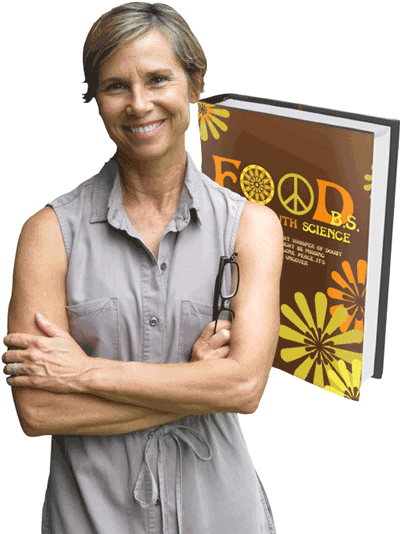
About Barbara McDermott
Regarded as America's #1 Insulin Suppression Coach, Barbara is the co-founder of SHIFT Health & Wellness Solution, and the best-selling author of the groundbreaking book, ‘FOOD B.S.’, With SHIFT, Barbara brings common sense to nutrition, weight loss and health gain. Her refreshing, no nonsense approach to uncovering the truth using non-negotiable rules of science demystifies food and how to defeat chronic disease once and for all.

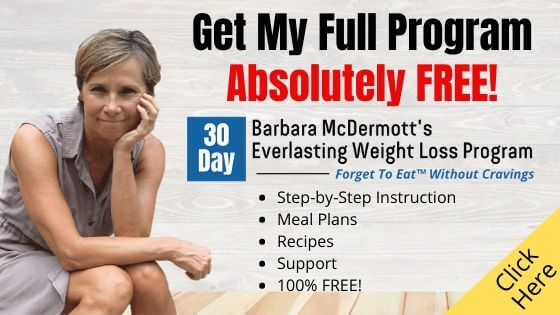

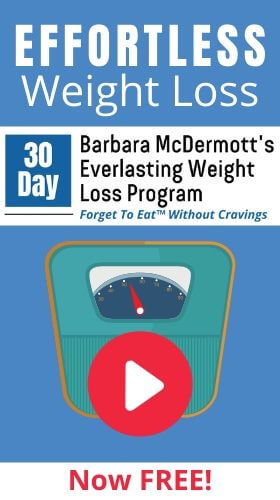
This is one of the most comprehensive, easy to digest, written in plain language articles I have read in my three year journey getting away from the carb life. Thanks for never giving up on your mission, your message, and our good health.
Jody Stumpe
Thank you Barb. Sobering and true.